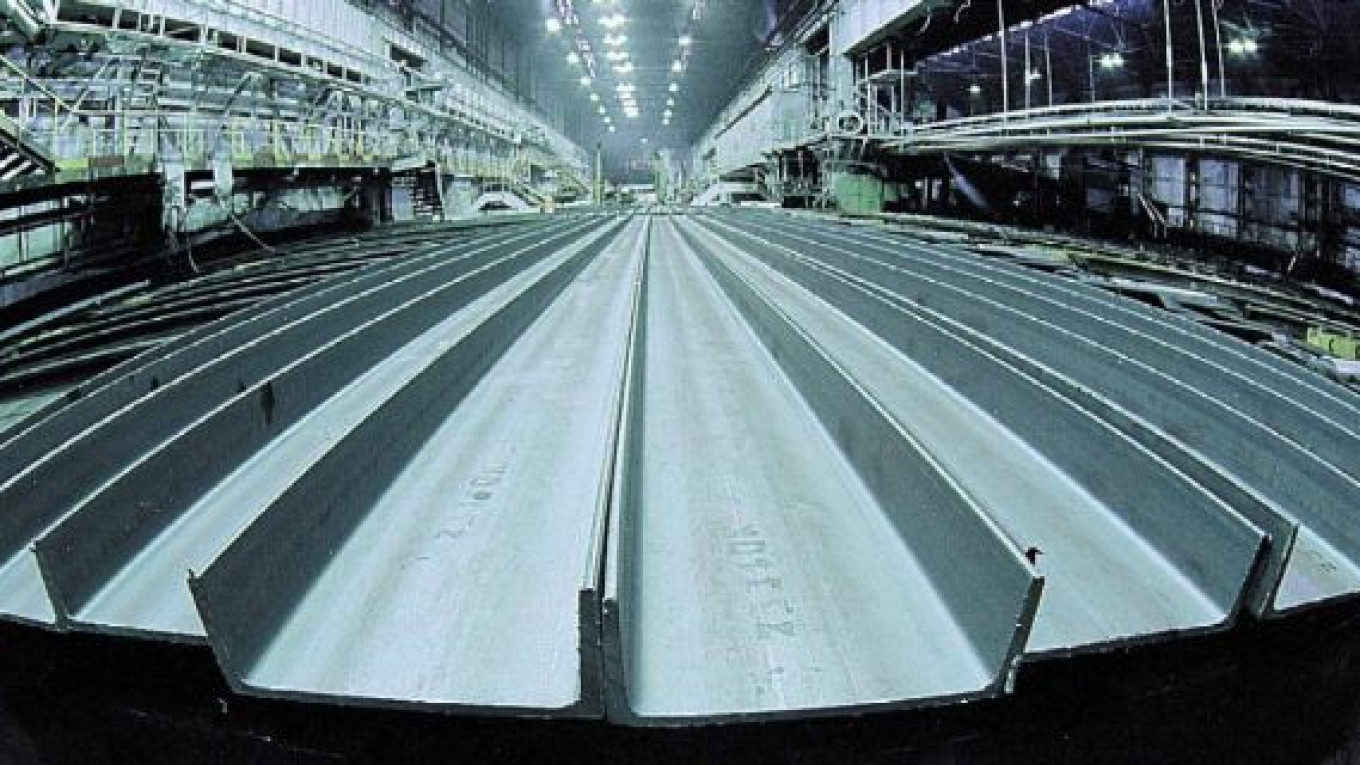The country's biggest steel maker Evraz is seizing on record-low borrowing costs for its American subsidiary to expand in the United States even as the European debt crisis sends yields on its international bonds soaring.
The company is taking a $610 million, five-year loan through its Portland, Oregon-based unit and paying annual interest as low as 150 basis points over the London interbank offered rate, half the margin on its previous loans, the company said by e-mail on Jan. 11. The yield on Evraz's $850 million of dollar-denominated bonds due 2018 has jumped 269 basis points from an all-time low in June to 9.157 percent now.
While ArcelorMittal, the world's largest steelmaker, has left plants idle in Europe as the debt crisis crimps demand, Evraz is boosting rail capacity in the United States by 10 percent this year to lift revenue in the Americas from 24 percent of the 2010 total. Evraz's loan margin is still almost double the 79.5 basis points paid by higher rated U.S. steelmaker Nucor on a $1.5 billion five-year loan it got in February.
"The rates are lower in the United States as banks value borrowers that can pledge local American assets," Stanislav Ponomarenko, an analyst at Barclays Capital in Moscow, said by phone. "It would be harder for the banks to demand anything from companies with all of their assets in Russia in case of a default."
Evraz is the largest producer of railroad tracks in North America and is rated B1 by Moody's Investors Service, eight levels below Nucor, the largest U.S. steelmaker by market value.
"In all the markets, except for Europe, we don't see a decline in physical demand for steel," Pavel Tatyanin, Evraz's senior vice president for international assets, said by e-mail. "Our clients maintain low stocks and are buying steel based on end users' demand."
Evraz's U.S. loan is at least 130 basis points, or 1.3 percentage points, cheaper than the rate its Luxembourg-based parent company pays on a $950 million five-year loan obtained in 2010, according to data compiled by Bloomberg.
Severstal Columbus, the U.S. unit of Severstal — the second-biggest Russian steelmaker, which has about 30 percent of its output in the U.S — pays 250 basis points over Libor on a $350 million five-year loan obtained in July, data compiled by Bloomberg show.
Cherepovets-based Severstal said it plans a 45 percent increase in North American output to 5.2 million metric tons this year. No decision has been taken on financing options, Natalia Ivanova, Severstal's spokeswoman, said on Jan. 11.
The cost of protecting Russian debt against nonpayment for five years using credit-default swaps fell six basis points to 250 basis points late last week, down from last year's peak of 338 on Oct. 4, according to data provider CMA, which is owned by CME Group and compiles prices quoted by dealers in the privately negotiated market.
The contracts pay the buyer face value in exchange for the underlying securities or the cash equivalent should a borrower fail to adhere to its debt agreements.
The extra yield investors demand to hold Russian debt rather than U.S. Treasury bonds narrowed four basis points to 340, according to JPMorgan Chase's EMBIG indexes. The difference compares with 236 for debt of Mexico — rated the same Baa1 level as Russia by Moody's Investors Service — and 229 for Brazil, which is rated one step lower at Baa2 by Moody's.
The yield spread on Russian bonds is 80 basis points below the average for emerging markets, up from a 10-month low of 32 on Oct. 4, according to JPMorgan's indexes.
Export steel prices from Russia have climbed 70 percent from a low of $340 a metric ton since the 2008 global financial crisis and prices will be supported as Europe's debt problems spur looser monetary policy, George Buzhenitsa, an analyst at Deutsche Bank, said in a Jan. 9 report.
Severstal, with $4.1 billion of net debt, can fund its domestic program from its own income, Boris Krasnoyenov, a metals and mining analyst at Renaissance Capital in Moscow, said by phone on Jan. 11. Evraz, which had $7.2 billion of net debt at the end of September, has no major investment projects in Russia, he said.
While Evraz has a "good" debt profile with long-term loans, the new U.S. borrowing will improve it "even more," VTB Capital analyst Kiti Pantskhava said Jan. 11.
A Message from The Moscow Times:
Dear readers,
We are facing unprecedented challenges. Russia's Prosecutor General's Office has designated The Moscow Times as an "undesirable" organization, criminalizing our work and putting our staff at risk of prosecution. This follows our earlier unjust labeling as a "foreign agent."
These actions are direct attempts to silence independent journalism in Russia. The authorities claim our work "discredits the decisions of the Russian leadership." We see things differently: we strive to provide accurate, unbiased reporting on Russia.
We, the journalists of The Moscow Times, refuse to be silenced. But to continue our work, we need your help.
Your support, no matter how small, makes a world of difference. If you can, please support us monthly starting from just $2. It's quick to set up, and every contribution makes a significant impact.
By supporting The Moscow Times, you're defending open, independent journalism in the face of repression. Thank you for standing with us.
Remind me later.






